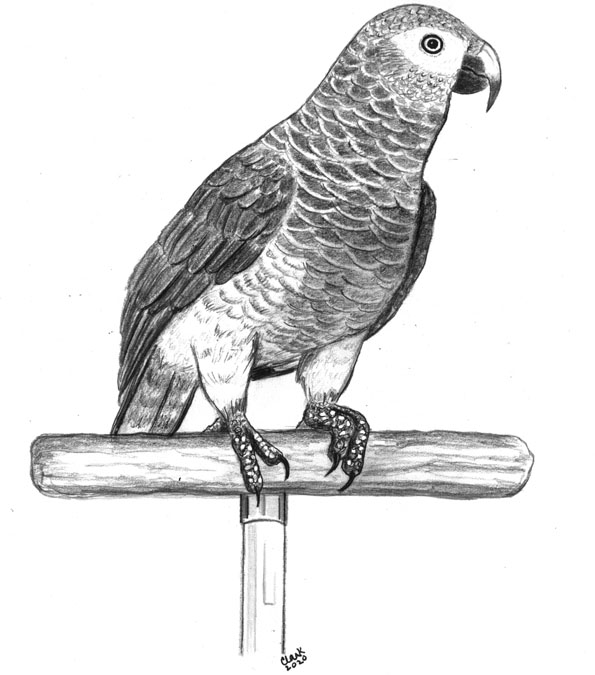
Happy Belated National Bird Week…sort of:
A few weeks ago, my wife asked me if I knew that yesterday (Jan. 5th) was National Bird Day. I was a bit embarrassed to admit that I had never even heard of this amazing-sounding holiday. How is it celebrated, I asked? Is there a parade where everyone dresses up like a duck, while waving chickadee flags? Are there snacks made of birdseed? I pressed my wife for more details, but other than the date, she didn’t know much more about it. I assumed National Bird Day would be a day of fun to celebrate the birds around us. After a bit of research, it turns out National Bird Day is not much fun at all. In fact, it’s less a day of celebration and more a day of awareness, with a bit of scolding thrown in. So much for the fun.
In 2002, two organizations, Avian Welfare Coalition and Born Free USA, joined forces to create a day they hoped would shine light on the dark side of the pet bird industry and on the plight of wild birds captured for human entertainment. I’m a little naïve, but I was surprised to learn how popular exotic pets still are. I thought we had moved away from all of that. After all, abusive animal circus acts are mostly a thing of the past and the once- fashionable sea mammal shows have fallen out of favor. But apparently, plenty of folks still think wild birds are better off in captivity. I don’t get it.
As you might imagine, the family of birds most abused by this industry are parrots. People love to put parrots in cages. For example, in one eight-year period, one and a half million African Grey Parrots were captured and sold as pets. In itself, that number is staggering, but it’s actually much worse than that. That total doesn’t include the birds sold on the black market or the ones that died along the way. If you are wondering how wild birds can possibly sustain such exploitation, the answer is they can’t. Here’s a pop quiz: Guess what these countries all have in common: Angola, Burundi, Ghana, Guinea, Liberia, Nigeria, Kenya, Rwanda and Tanzania. These are countries where the grey parrot has been totally extirpated. Sadly, there are now more African Grey Parrots living in the homes of Americans than there are roaming the wilds of Kenya or Tanzania. That’s not good.
Wild-caught birds were so popular in the ‘80s that environmental groups pressured Congress to do something about protecting them, and believe it or not, Congress responded. (Remember when Congress actually did stuff?) In 1992, the first President Bush signed the Wild Bird Conservation Act. It was now more difficult to import certain birds, especially threatened species. Unfortunately, the act also created an assortment of new problems. Illegal bird smuggling quickly became more rewarding for the smugglers, which in turn, made things a lot deadlier for the birds. Sigh!
To replenish the “inventory” caused by the import restrictions, the pet industry began breeding more birds. This was good news for the wild birds, but not so great for the ones in captivity. Parrot “puppy mills” quickly sprang up, with profits being more important than the welfare of the birds. And as “locally grown” exotic birds became more available in pet shops, more folks were tempted to buy one. But guess what…birds, especially parrots, are a lot of work. They can be loud, aggressive, destructive and sometimes say curse words (which is funny, but not really). Many unhappy consumers end up with a serious case of buyer’s remorse. It’s the old “it seemed like a good idea at the time” syndrome. The pretty bird in the pet shop is now trashing their house. In addition, parrots live for a long time. How long? Amazon Parrots often live for over seventy years. That means the parrot you buy today will mostly likely attend the reading of your will. This brings up another quandary: Who is going take care of your beloved bird when you croak? Not me. I only enjoy free-flying birds. Speaking of that…
Occasionally, well meaning people visit my shop with a pet bird of some kind on their shoulder. They probably think I’d like to see it. I don’t. I enjoy birds, but only in the wild. A bird that can do tricks or say a few words in English isn’t really my thing. It’s like seeing elephants paraded around under The Big Top or an orca trapped in a tank of water. Thanks, but no thanks.
I have friends who would argue that their pet bird is well cared for and an important member of their family. I don’t think the sponsors of National Bird Day are pointing a finger at these people. Instead, they want to focus attention on the illegal trapping, the black market and unethical domestic breeders. They also want would-be bird owners to do some research beforehand or for them to watch Allison Argo’s Parrot Confidential, the wonderful PBS special on this very topic. And more importantly, contact a parrot rescue organization. These places have lots of birds, too many birds, and they all need adoption, which should tell you something.
Local birders tend to be concerned with Ospreys, bluebirds, etc. It would be nice for at least one day, maybe next Jan. 5th, if we put some energy into helping to save the world’s dwindling parrot population. Also, we should make folks aware of the potential problems of owning an exotic bird, before they go home with something that “seemed like a good idea at the time.”